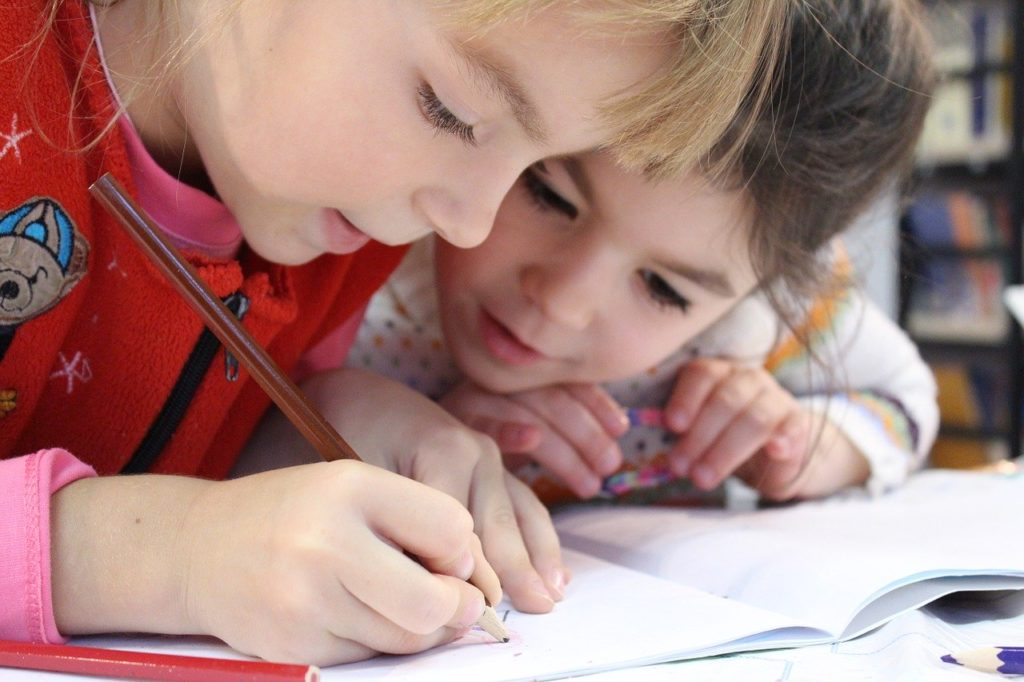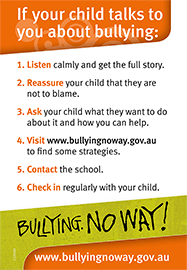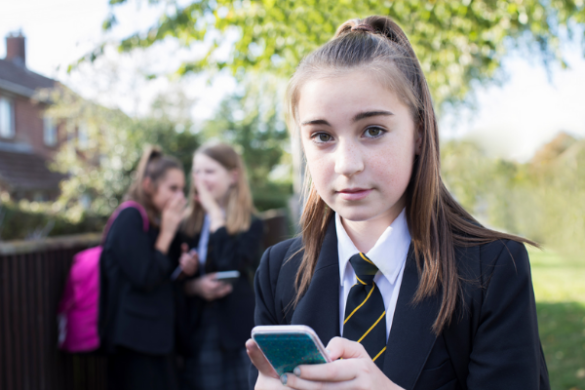Finding out that your child is being bullied at school is heartbreaking – but for most parents, finding out their child was doing the bullying would be devastating too.
Schools are very integrated little ecosystems, with children of all shapes, sizes, abilities, religions and cultures attending them.
All schools should have active policies which are strongly anti-bullying but there’s always a bit more that you as a parent can do to help your own child.
March 19th is the National Day of Action Against Bullying, so to help you take action, we’re offering you some tips to help your child at school. These tips will assist you and your child to identify if they are being bullied, as well as tips to help them be kind, respectful and inclusive to others in their school.
I saw the most gorgeous act of kindness recently at my son’s school assembly
A tiny group of Grade 3 girls got up to speak, with prepared cue cards as large as themselves – to talk about how they were creating a friendship group that anyone was welcome to join. They would accept anyone and listen to your ideas, they were available every lunchtime.
These children had come up with this idea on their own and approached the principal to see if they could speak at assembly. The sincerity and compassion in their words made me happy-cry for the next generation, and believe that anything is possible.
In truth, every school needs a friendship club, and at the same time, we hope that none of them do, because no child should feel alone and outcast and be wandering around at lunch looking to be accepted.
Let’s see what we can do to make this happen…
What is bullying?
All children feel strange and different from their peers at one time or another. They may feel left out or stared at because of the brand of their shoes or the contents of their lunchbox. Some feel awkward because they’re new, have a disability, or are in a cultural minority at the school.
There can be a big difference between feeling unaccepted or excluded, and being bullied. But sometimes they’re the exactly the same.
Bullying is repeated, ongoing and deliberate behaviours that cause mental, social or physical harm to the victim. They happen through the misuse of power in a relationship and can come from an individual or a group. They can happen in person or online and may be obvious or more covert, but they’re mainly categorised by being deliberate and ongoing, and by the victim feeling they’re in a weaker position to their bully.
One-off fights or incidents between equals in the playground are not bullying, nor is hurting someone on occasion by accident or omission.
But you can constantly exclude someone for being different, even without meaning to hurt them, and this is bullying. You can draw attention to their differences in your actions or words and when you do this repeatedly it can have long-term damaging effects.
Your child could be bullying someone without them or you even realising it.
This is why it’s so important to talk to your kids about what bullying is and how being repeatedly excluded feels – and why we should accept, respect and be kind to everyone despite their differences.

What can you do?
Bullying, No Way is a great online resource, which includes tons of articles and even short videos for kids or adults.
Point out that bullying is not just when someone is mean to you once, but that it happens over and over and makes you feel like you can’t stop it. You could start a discussion using some of these questions:
- What do you think ‘bullying’ is?
- Have you seen bullying happening? What did you do? How did you feel?
- Why do you think some people bully other kids?
- Who are the adults you would talk to when it comes to things like bullying?
- Have you ever felt scared to go to school because you were afraid of someone bullying you?
- Has someone tried to bully you? What ways have you tried to change it?
- What do you think parents can do to help stop bullying?
- Have you or your friends left other kids out on purpose? Do you think that was bullying? Why or why not?
- Have you ever tried to help someone who is being bullied? What happened? What would you do if it happens again?
There is also the Take a Stand Together app which can help.
How can you help your child be more accepting?
You may not have realised this, but the orange that everyone is encouraged to wear on Harmony Day is the colour of social communication and meaningful conversations. It’s about the freedom of ideas and the encouragement of mutual respect.
You can help your child to be accepting and inclusive of others by starting these conversations with them – by talking about how people are different and also about how we’re the same.
Talk about how we can choose our friends because we like the way people think or act towards us, because we like their personalities, interests or qualities.
Talk about how appearance and ability shouldn’t have anything to do with who our friends are, and that everyone deserves a chance to show us how they think and feel before we make up our minds about being their friend.
We can also talk about how you can choose to not be someone’s friend and still be respectful and kind towards them.
These are important conversations that will also help your child learn to love and accept the differences in themselves too.

If your child is being bullied…
How you respond to your child is very important.
Your child needs to feel that they’re being listened to and heard by you – and that their feelings matter, and their distress is being taken seriously. They need to feel that something can change, and they can regain some control of their situation, as well as start to look forward to going to school again.
Remain as calm as you can while your child tells you what has been happening.
This can be difficult because if someone is hurting your child it’s natural for the lioness in you to come to life. Don’t immediately try to fix the problem yourself (sometimes when we react, we make things worse.)
Reassure them that they’re not to blame, and that anyone in their position would feel the same way. They don’t deserve to be bullied and their feelings in response to the situation are warranted.
Get full details and talk to your child about what they want to do, and what they want you to do.
There are lots of strategies that you can help with to manage the matter, including talking to the school and seeking professional help if necessary. It may include talking to the bullies and their parents, changing classrooms, joining new friendship groups or social outlets, or even changing schools if it comes to that.
It’s about resolving the matter together and giving your child the power to assist themselves – not just jumping in to fix things.
Create an environment where your child knows they can come to you anytime and be heard. Check-in with them regularly so they know you’re there whenever they need to talk.

